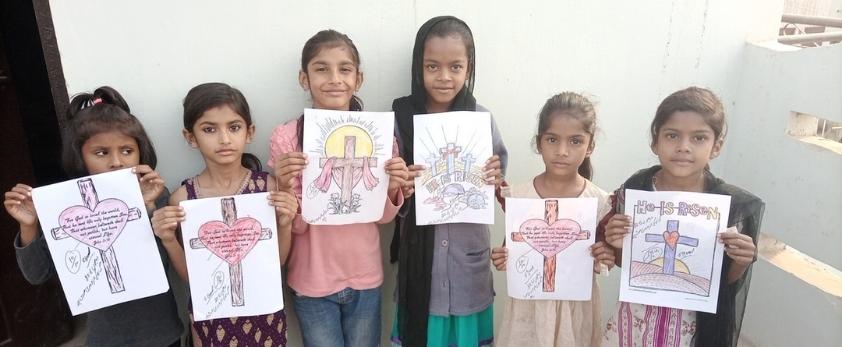Mission History in Pakistan
2002: WELS receives the first communication from our contact in Pakistan requesting Christian literature. Christian literature is sent, and translation of Christian literature into the Urdu language begins.
2003: Four volumes of the Bible Teachings Series and The Promise are printed in the Urdu language for use in Pakistan.
2004: Our contact reports that copies of The Promise are being read throughout Pakistan and also in Afghanistan. The establishment of a Bible correspondence program is proposed.
2005: A shipment of 14,000 books, mostly in English, is sent to our contact in Pakistan. A Bible training camp is held with 21 teachers in attendance. The WELS Board for World Missions resolves that “the mission program in Pakistan continue as a seed-sowing ministry” and a coordinator is appointed for the work. WELS Christian Aid and Relief provides funds to assist victims of the devastating earthquake that shakes northern Pakistan. Two WELS pastors make the first mission visit.
2006: The Bible correspondence program receives funding for two years. More than 1,300 students enroll in the program. A second mission visit is made to help construct facilities on the third floor of our contact’s hospital. $10,000 from World Missions is allotted to accommodate the offices, storage space for books, and a meeting hall for the Bible correspondence program. Permission is given to begin a free mobile clinic program, using humanitarian aid funds to purchase a van. This free clinic program serves as a bridge to provide Christian materials to Pakistanis.
2007: The last book of the Bible Teaching Series used in the Bible correspondence program is translated into Urdu. A third mission visit is made. It is reported that 9,000 people have been enrolled in the Bible correspondence program since its inception in February 2006. A goal to enroll an additional 10,000 people is proposed. Eighteen booklets of Sunday school materials are translated into Urdu.
2008: Funds are provided from a private source for two years to expand the Bible correspondence program to include three more full-time workers and one part-time worker. A website is launched in Pakistan to promote the Bible correspondence program. The site is in English but will also be provided, at a later date, in Urdu. There are six full-time and eight part-time workers involved with the Bible correspondence program.
2009: In just three years, God doubles the number of people enrolled in the Bible correspondence and teaching school from 10,000 in January 2007 to 21,000 in January 2009. An Urdu version of the Road to Emmaus movie is broadcasted to the public at Easter. The Promise, which tells the story of God’s plan of salvation, is translated into Punjabi and 20,000 copies are printed. It was also previously published in Urdu and Pashtu. Humanitarian aid such as medical clinics, midwife-training classes, and literacy classes are provided.
2010: The Confessional Evangelical Lutheran Church of Pakistan is born. Thirty-four adults are confirmed after going through a 19-lesson Bible information course. Since 2006 the Bible correspondence and teaching school has distributed 118,191 pieces of literature and has enrolled 26,041 adults and children. A new correspondence curriculum for adult confirmation using 12 first-level Bible Teaching Series books is implemented. Work begins on an Urdu translation of Luther’s Catechism. The Sunday school ministry serves 1,341 children with 79 teachers. Humanitarian aid is shared through free medical clinics and flood relief.
2016: The Confessional Evangelical Lutheran Church of Pakistan grows to more than 150 members and 52 house churches. The house churches use Luther’s Catechism for weekly worship services. The Bible correspondence and teaching school has more than 50,000 students enrolled. Efforts to establish a Bible institute and seminary begin. The national church has eight non-formal schools to allow underprivileged children to receive an education. A 30-minute television program, “God So Loved the World” intended for Christians throughout the Muslim world, is being broadcast weekly. It includes an illustrated Bible story, a lesson from Luther’s Catechism, and a puppet show. The program’s associated website provides Christian materials in Urdu, the main language of Pakistan, as well as English. WELS Christian Aid and Relief continues to provide humanitarian aid through free medical clinics, earthquake and flood relief, as well as food distribution at Christmas and Easter.
2018: In August, the first ten-day Bible institute/seminary class is held for 11 men and some of their wives in Pakistan via Skype. WELS’ friendly counselor to Pakistan and his contact, both based in the U.S., teach the class from 10 p.m. to 6 a.m. each day so it could be held during the daytime hours in Pakistan. The men visit four to five different house churches every week and teach what they learned. There are 56 house churches total. The women teach the children through Sunday school and non-formal school.
2020: 150 men and women are being served through the 3-day, online monthly Bible institutes. An online weekly Bible study on Saturday mornings is offered for 100 men and women. Leaders meet online every morning, Monday through Friday. The 28 house churches conduct worship services every Sunday. There are 25 Sunday Schools, 1 formal school, and a Christian High School. The 25 Sunday Schools serve nearly 1,000 children. With the help of the local members, the first church facility in Pakistan is built and the second is begin worked on. The Bible Correspondence course has enrolled more than 60,000 people since it’s inception.
2022: With the help of our WELS Pastoral Studies Institute (PSI), a new theological training program begins in fall. The Bible Correspondence course has enrolled more than 63,000 people since its inception. WELS partners with another group of Christians in Multan.
SUPPORT PAKISTAN
Consider supporting mission work in Pakistan with your prayers and gifts.
PICTURES OF ASIA
Browse through and share pictures of Asia taken by WELS missionaries and national workers.


